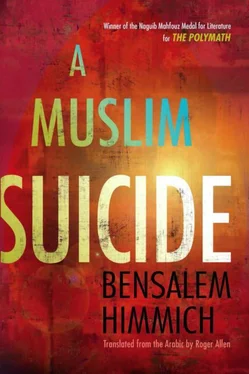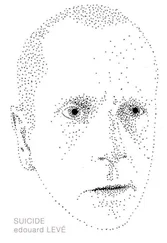I paused for a moment, both to recover my breath and to allow my scribe to catch up.
"Among recent citizens of Andalus," I went on, "I'm not the only one to have had this insistent feeling. During a short sojourn in Cordoba, I happened to be visiting the bookstore of a Jewish merchant from the Tayyibun family and came across The Summary of the Almagest. I noticed precisely the same feeling in the author's, Ibn Rushd's, attitude, as if a fire had broken out in his house. That required him to provide a much-needed and useful summary, in terms of mode of composition, collecting a lot of information and then providing a precis. Even when dealing with the Burhaniyya, he eventually resorted to the same sifting process, subjecting the materials to severe editing and abbreviation-a sieve with very narrow apertures indeed. In making this comparison, I'm trying to allude to the possibility that, during Abu Walid ibn Rushd's time in Andalus-something he mentions only rarely-he may have sensed that he was experiencing within himself the crises and degradations of his own age, as he witnessed the gradual fading of the glorious times of the past and the end of an era. As evidence, we can point to his terse allusions to `anxieties' and `troubled times,' not to mention his unfulfilled promise (in spite of his long life) to write about this or that topic `in much more detail.' He would regularly use the following expression: `If God gives me sufficient time and I can rid myself of this lack of time.' In my own case, I'm not promising to write a more comprehensive or detailed work, something that I won't be able to do however long my life may be. The feeling that stays with me and that I've no power to overcome is best expressed in the prophetic hadith, `Pens have dried up, and pages have been closed."'
I stopped talking abruptly; it was as if my tongue had dried up as well. I signaled to Abu al-Hasan to stop taking notes, and he did so. I saw that he was looking in dismay at my packed-up belongings.
"What does this pile of baggage mean, my master?" he asked.
"My dear, generous friend," I responded, "the expectations of hospitality have long since been met and surpassed. Now it's time for me to move on."
"In this house there are no hosts or guests. When I'm not here, it's available for passers-by and people who have nowhere else to stay. However, if you've decided to move on, I'll certainly not stop you. I've always enjoyed travel myself. Fairly soon I plan to go to Fez and Meknes. And if you will permit me, I'll also go up to Sabta and Tangier and get some news about your family and loved ones. All being well, I'll bring you news of them all in Cairo."
I was so moved and delighted that I embraced him and kissed his head.
"I don't need to give you permission," I said. "In fact, I have a specific request. I'll not leave Cairo for Mecca until I feel sure that my family is safe and that I'll be able to return to them once I've performed the pilgrimage."
"With God's help your wishes will be fulfilled. I have to leave now to perform at a reception, and then again at a Sufi ceremony. Tomorrow morning, my beloved friend, give me whatever instructions you wish."
With that he said his farewells and left. I turned toward the qibla and devoted myself to prayers and supplications. That done, I finished packing my belongings, then lay down to get some rest. While I was dozing, I heard the guard dog barking. It stopped all of a sudden, and there was a scary silence. From the stable I heard a strange, troubling neighing from my horse. My nerves on edge and my thoughts racing, I rushed to the place where the noise was coming from. I spotted a shadowy figure hurrying away like lightning. Instead of running the risk of chasing after him, I decided instead to check on the animals. Thank God, the horse was fine, and I hurriedly brought him into my room, fondling his head as I did so; he seemed much more relaxed now. That done, I went to check on the dog outside the house; unfortunately what I found was its lifeless corpse lying at the base of the mountain. I dug a hole and buried it as quickly as possible so that I could go back to my room and take all necessary precautions. In case of emergency I kept a thick stick by my side. I assumed that the person who had killed the dog either intended to steal my horse or else had been sent by someone else to scare me into leaving town as soon as possible. I spent the rest of the night wide awake, part of it packing my bags and putting them on my pack animal, but also performing ablutions, changing clothes, and praying.
At daybreak Abu al-Hasan arrived looking delighted and fully alert.
"I can see that, like me, you haven't slept much!" he said as he embraced me and offered me a table full of milk and loaves of bread. "I hope, my Lord, that everything is fine."
I gave him a brief account of what had happened the night before. He did not panic or seem in the least surprised, almost as though he was used to such things or regarded the entire episode as something without particular significance or meaning. After having something to eat and drink, I stood up and told him of my intention to travel to Tunis by sea. I asked Abu al-Hasan if there was enough time to go and say farewell to his friend the copyist, and to visit a charitable house in Bijaya. He indicated that it was possible. We set out to visit these people, with my companion leading my horse behind him. When we reached the house, I asked for the warden, who arrived with warm greetings. I gave him two bags of gold pieces, asking him to spend them for the benefit of orphans. The man took them with a good deal of astonishment and proceeded to offer profuse thanks, while Al-Shushtari himself sang my praises. We left the charity pursued by a positive flood of fervent prayers from the warden, then made our way to the copyist's place. No sooner had we arrived than he greeted us warmly. My companion told him that I was coming to say farewell, and he wished me well on my travels. He entreated me to take two baskets of dried fruit, which he proceeded to pack in my saddlebags. I in turn placed a bag in his hand.
"One good deed begets another," I told him, "but it is the initiator who is the most generous. This is a gift from me. Perhaps you'll be able to use it for your own needs and those of your family."
"But make sure, Hamada," my companion added by way of a joke, "that you stock your shelves with beneficial knowledge and cut down on the amount of dates, beans, and lentils that you eat!"
The man looked at the contents of the purse and was obviously both stunned and delighted. As I said farewell and embraced him, he proceeded to raise his hands to the heavens, uttering prayers on my behalf and almost choking with tears. "May God be generous to you, Sir," he said, "grant you victory over those who oppose you, and preserve you for the ones you love and care for. God…"
We made our way through a market teeming with people and animals. Vendors and passers-by all begged my companion to chant one of his poems for them. Over and over again he had to say, "Leave me alone, leave me alone. I'm currently saying my farewells to someone who has claimed a predominant place in my heart!"
Once we reached the port, we discovered that the boat was ready to leave. All I had time to do was to add further to the tasks I had already asked Abu al-Hasan to perform in Sabta. I requested that he inquire as to the conditions of people in Andalus; the governor, Ibn Khalas; and the warden, `Abd al-Barr al-Baradi'i. I also asked him to seek information about my students in Granada through their friends in Sabta. I handed him a letter addressed to them, a second one to the Sabta students themselves, and a third to my wife. I hugged him and whispered in his ear, "Beloved friend, no bond can be stronger than ours. We'll meet again at the Azhar Mosque in Cairo in four or five months."
Читать дальше












